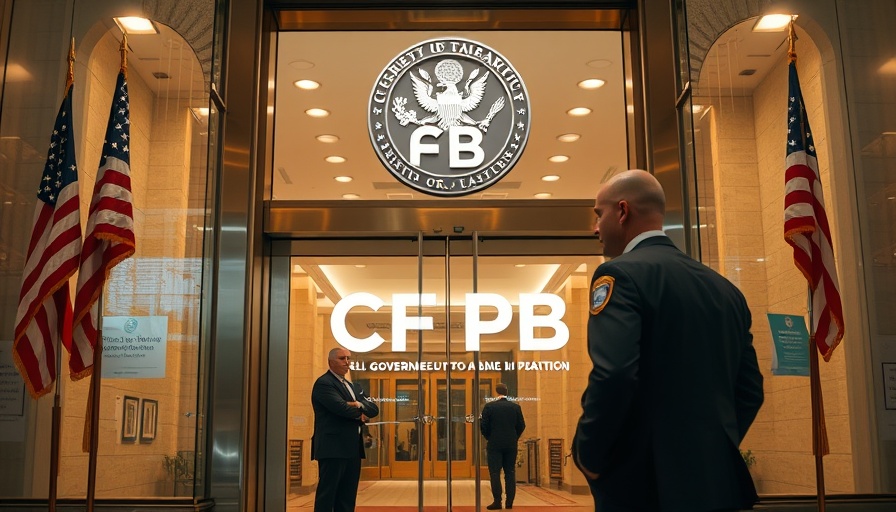
Understanding the CFPB’s Evolving Role
The Consumer Financial Protection Bureau (CFPB) was originally established with the goal of protecting consumers from unfair and abusive financial practices. However, recent reports suggest that the organization has been effectively silenced, as employees describe a lack of oversight and enforcement due to directives from the current administration. This shift has raised serious questions about the bureau's impact on Detroit entrepreneurship and the financial protections available to Michigan's small businesses.
The Directive’s Impact on Operational Efficiency
As CFPB employees report a complete halt on their work, the implications for local economies, particularly in Metro Detroit, are significant. A traditionally active agency that had returned around $21 billion to consumers over 15 years is now virtually inactive. With fewer watchdogs, consumer confidence in financial institutions may decline, leading to hesitance among entrepreneurs to engage with banks. This could stifle Michigan small business growth as startups increasingly rely on financial institutions for backing.
Challenges for Business Owners
Business owners in the Detroit area might feel uneasy knowing that the agency designed to protect them has become inactive. Largely forgotten and unobliged to respond to communications, CFPB’s declining oversight could spell trouble for business owners facing potential financial disputes. Without a buffer against illegal financial practices, entities committing wrongdoing face less risk of repercussion, weakening the trust that is essential for healthy economic growth in the region.
The Shift from Protection to Inaction
The dramatic pivot from enforcement to inaction highlights an ongoing political tug-of-war that affects the local economy. The CFPB’s former approach under President Biden, which carefully scrutinized practices such as high overdraft fees, is a stark contrast to the current administration's indirect order for inaction. The proposal to cap overdraft fees significantly impacted the financial landscape by potentially saving consumers upwards of $5 billion a year—an ideal outcome for Michigan's general population and a boon for Detroit business expansion. The rescinding of such proposals only fosters an environment where businesses might feel emboldened to act against consumer interests.
Potential Risks and Challenges Ahead
The current operational status of the CFPB poses considerable risk for the community. Existing investigations into well-known financial entities are either delayed or entirely neglected, leading to a growing distrust among Michigan's entrepreneurs and innovators. If financial institutions see little incentive to comply with fair practices, it can culminate in a wider distrust of the banking system. For Detroit commercial real estate and other burgeoning sectors leveraging financial services, these changes could lead to long-lasting detrimental impacts.
Consequences for Economic Policy in Michigan
The implications of a weakened CFPB extend into broader economic policy and planning in Michigan. With an apparent lack of enforcement, local policymakers could encounter difficulties maintaining a healthy investment climate. In regions like Metro Detroit, where community partnerships finance many startups and innovations, a struggling CFPB may create hurdles that growing businesses must navigate alone. Investors may think twice before committing substantial funds to vulnerable sectors where regulatory oversight appears compromised.
Conclusion: Call to Action for Stakeholders
As stakeholders in the economic landscape of Michigan, business owners, investors, and policymakers must critically assess the effects of the CFPB's diminished role. The vulnerability embedded in today's financial climate, exacerbated by this shift, requires a united front to advocate for robust consumer protections and fair practices. Understanding the implications of these changes can guide informed decisions and foster a supportive environment for Metro Detroit startups.
If you’re a business owner or investor in Michigan, consider joining local networks to discuss and strategize around these challenges. Advocacy for stronger economic policies begins with informed voices within the community.
 Add Row
Add Row  Add
Add 



 Add Row
Add Row  Add
Add 
Write A Comment